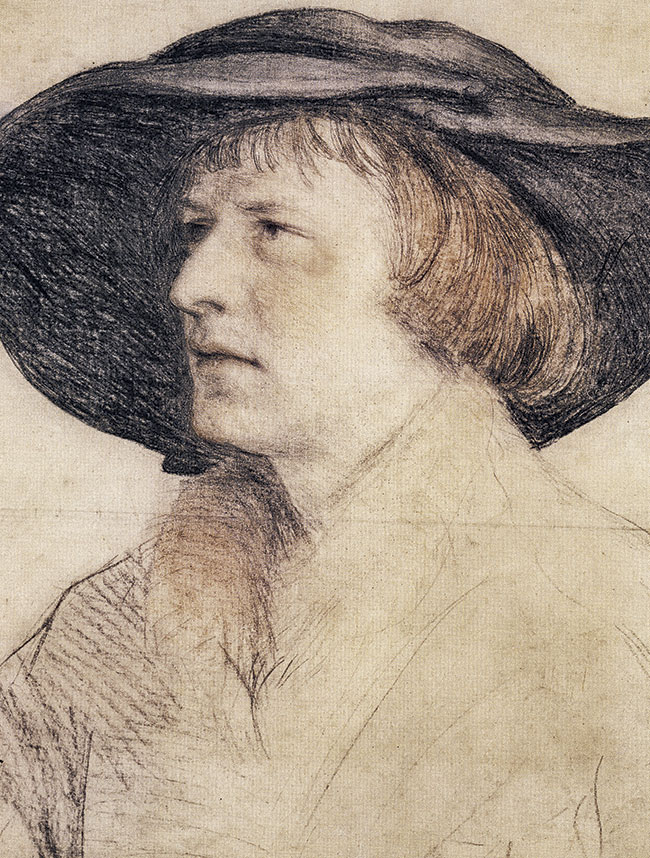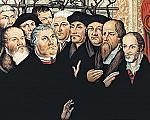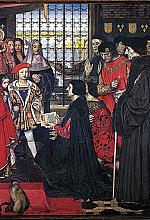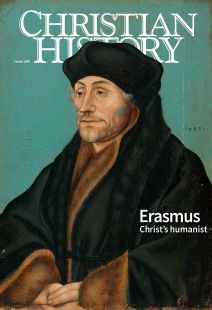Christian History timeline: Erasmus the traveling humanist

[Above: Hans Holbein the Younger, Portrait of Bonifacius Amerbach, c. 1525. Black and coloured chalk, metalpoint on the hat and hair—Kunstmuseum Basel / Public domain, Wikimedia]
—1456 Gutenberg produces the first printed Bible.
—1457 Lorenzo Valla, one of the most famous Italian humanists, dies.
—1466 Erasmus is born in Rotterdam.
—1483 Erasmus’s parents die of the plague.
—1488 Erasmus enters the Augustinian monastery at Steyn.
—c. 1489–1495 Erasmus writes The Antibarbarians.
—1492 Erasmus is ordained a priest.
—1495 Erasmus begins study at the University of Paris.
—1496 Erasmus publishes a book of poetry.
—1499 William Blunt invites Erasmus to England for his first visit. There he becomes friends with Thomas More and John Colet.
—1500 Erasmus publishes Adages. That same year he writes his often-misquoted letter about buying books before clothes (see p. 1).
—1501–1503 Erasmus lives in France.
—1503 Erasmus publishes Handbook of the Christian Soldier.
—1504–1506 Erasmus lives in the Low Countries in Leuven (in modern Belgium).
—1504 Erasmus publishes an edition of Valla’s Notes on the New Testament.
—1506–1509 Erasmus lives in Italy.
—1507 Johann Froben purchases the printing house of Johann Amerbach.
—1509–1514 Erasmus lives in England.
—1509 Jacques Lefèvre d’Étaples publishes the Fivefold Psalter, a biblical humanist work.
—1511 Erasmus publishes Praise of Folly. From 1511 to 1515, he serves as Lady Margaret’s professor of divinity at Cambridge.
—1512 Erasmus publishes a handbook of style, De Copia or On the Abundance of Words and Things.
—1514 Erasmus returns to the Low Countries.
—1514 Scholars at the University of Alcalá print the Complutensian Polyglot Bible. Erasmus meets Froben, who becomes a good friend.
—1515–1516 Erasmus travels frequently to Basel, preparing his New Testament.
—1515 Oecolampadius becomes Erasmus’s assistant in the preparation of his New Testament. Erasmus also befriends other future Reformation leaders including Capito and Pellikan.
—1516 Erasmus publishes Paraclesis and The Education of a Christian Prince and releases his edition of the New Testament. Influenced by Erasmus, Thomas More publishes Utopia. Martin Luther writes to Erasmus about their disagreements for the first time.
—1517 Erasmus becomes a member of the theology faculty at the University of Leuven.
—1517 Luther publishes the 95 Theses.
—1518 Erasmus publishes the first edition of his Colloquies.
—1519 Erasmus’s friend John Colet dies.
—1520 Erasmus publishes System and Method of True Theology. A group of young humanists gathers around Ulrich Zwingli in Zurich; many will later break away and begin the Radical Reformation.
—1521 Luther appears at the Diet of Worms.
—1521–1529 Erasmus lives in Basel.
—1522 Diego López Zúñiga attacks Erasmus in The Blasphemies and Impieties of Erasmus of Rotterdam.
—1523 Erasmus writes the Catalogue of All the Works of Erasmus of Rotterdam. He breaks off contact with Ulrich Zwingli. Ulrich von Hutten attacks him in Quarrel with Erasmus of Rotterdam, and Erasmus responds with The Sponge of Erasmus against the Aspersions of Hutten. Some Franciscan theologians first accuse him of “laying the egg that Luther hatched.”
—1524 Erasmus publishes Diatribe or Comparison on Free Will. He attacks Zwingli and Oecolampadius regarding their agreement with reformer Andreas Karlstadt.
—1525 Zurich radicals, soon called Anabaptists, baptize each other as adults. Luther responds to the Diatribe by issuing The Bondage of the Will. Around this time Erasmus becomes friends with Bonifacius Amerbach.
—1526 Erasmus publishes The Institution of Christian Matrimony. He also responds to The Bondage of the Will by Martin Luther by issuing A Warrior Shielding a Discussion of Free Will against the Enslaved Will.
—1528 The first Hutterite communities form; they study Erasmus’s writings.
—1529 Because Basel becomes Protestant, Erasmus moves to Freiburg.
—1529 Protestant leaders, including Luther, debate at the Colloquy of Marburg. Erasmus writes Epistle Against the False Evangelicals.
—1530 Erasmus writes A Christian Widow for Mary of Hungary. Lutherans present the Augsburg Confession, a statement of their faith, to the Diet of Augsburg summoned by Emperor Charles V.
—1531 Zwingli is involved in a translation of the Bible based in part on the work of Erasmus.
—1532 Erasmus writes Clarifications to defend himself against censures from the University of Paris.
—1533 Erasmus writes On Restoring the Unity of the Church.
—1534 Erasmus publishes On the Writing of Letters. Luther accuses him of questioning the concept of the Trinity.
—1535 Erasmus publishes Ecclesiastes: On the Art of Preaching. Henry VIII executes his friend Thomas More.
—1536 Erasmus dies while on a long-term visit to Basel. He had made Amerbach his heir and executor.
—1540 Erasmus’s complete works are first published.
By the editors
[Christian History originally published this article in Christian History Issue #145 in 2022]
Next articles
Living the simple life
“What else is a city,” Erasmus wrote, “but a great monastery?”
Edwin Woodruff TaitSupport us
Christian History Institute (CHI) is a non-profit Pennsylvania corporation founded in 1982. Your donations support the continuation of this ministry
Donate







